Unit 2 How often do you exercise? 固定短语具体用法讲义
文档属性
| 名称 | Unit 2 How often do you exercise? 固定短语具体用法讲义 | 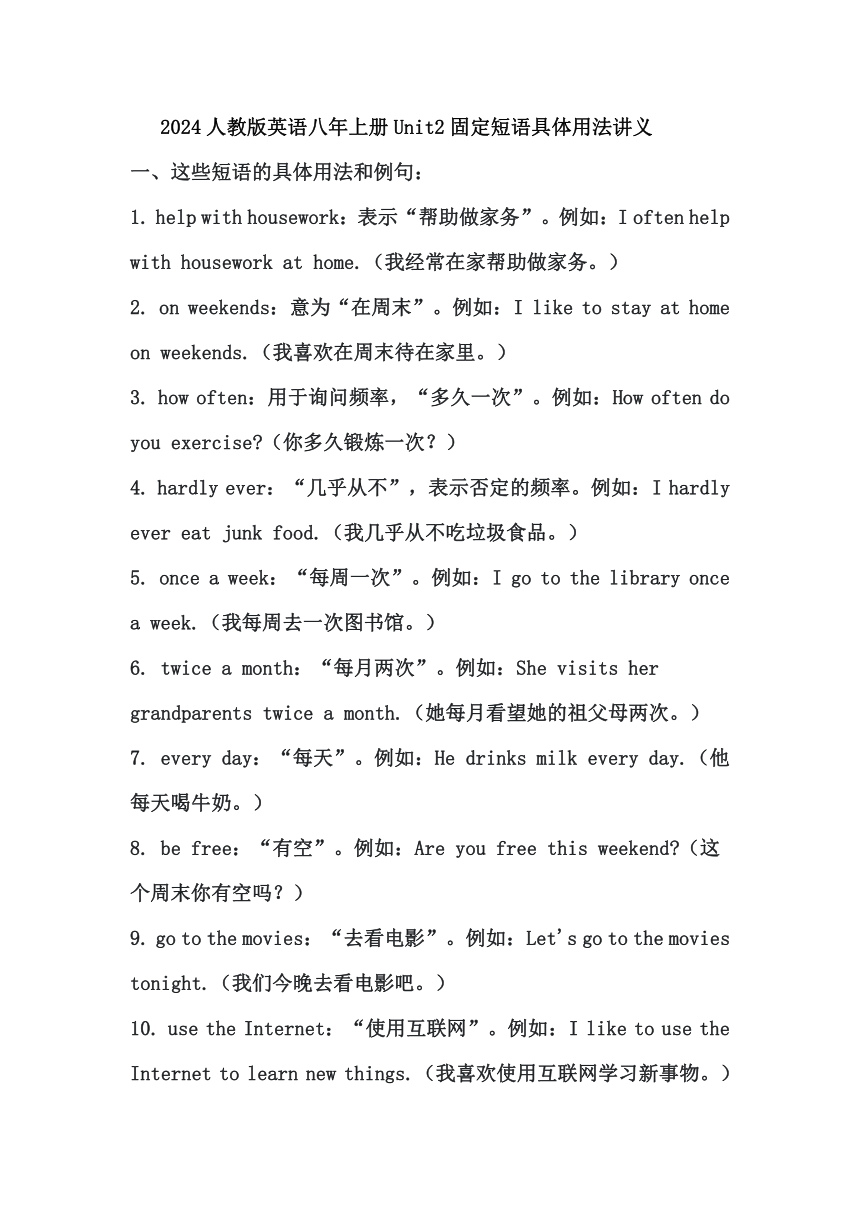 | |
| 格式 | docx | ||
| 文件大小 | 23.2KB | ||
| 资源类型 | 教案 | ||
| 版本资源 | 人教新目标(Go for it)版 | ||
| 科目 | 英语 | ||
| 更新时间 | 2024-02-08 10:41:45 | ||
图片预览

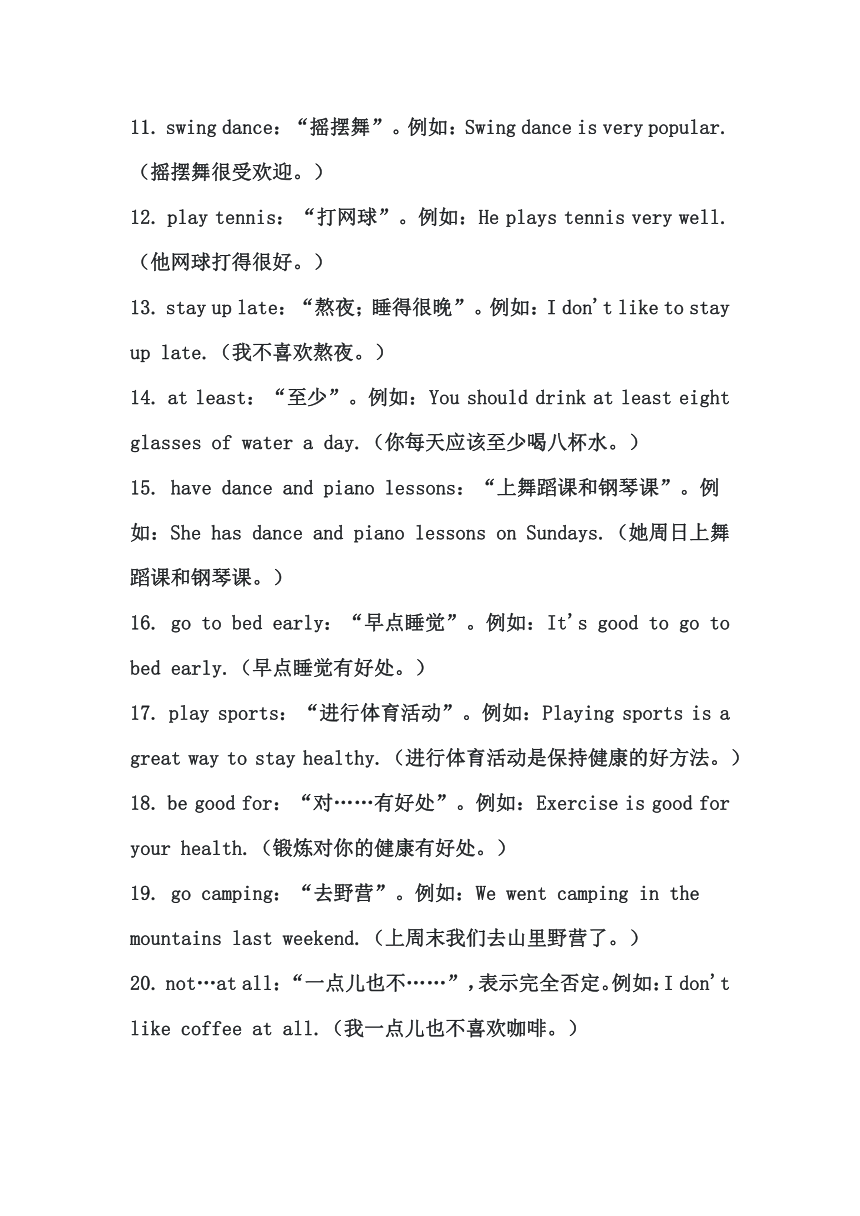
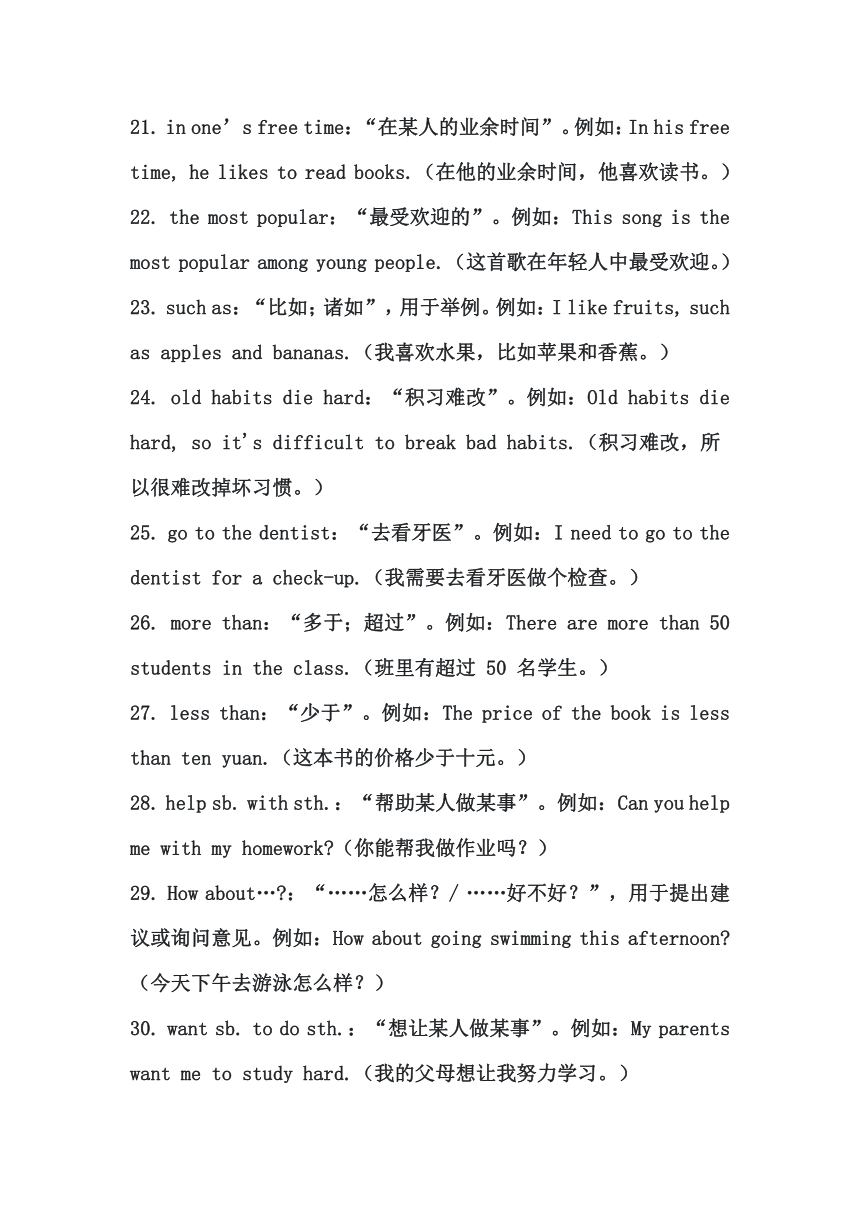
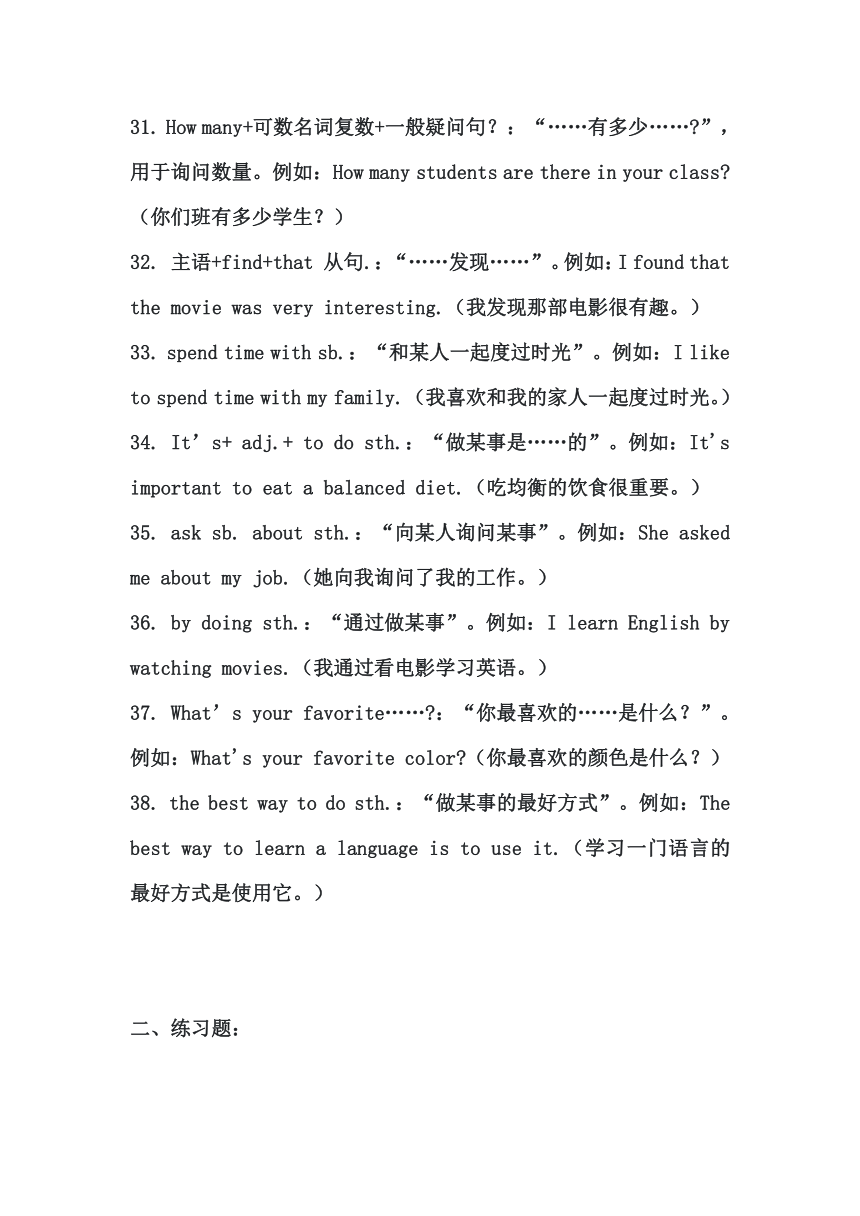
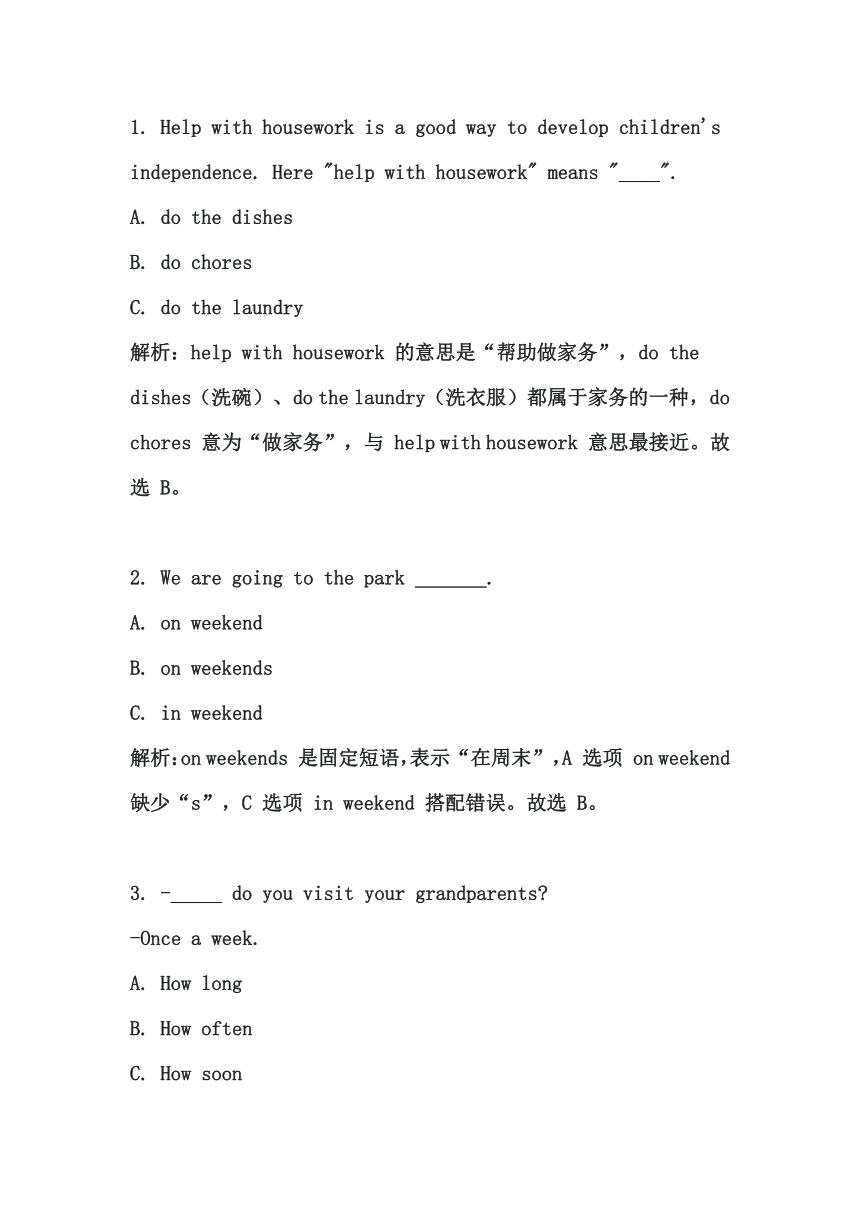
文档简介
2024人教版英语八年上册Unit2固定短语具体用法讲义
一、这些短语的具体用法和例句:
1. help with housework:表示“帮助做家务”。例如:I often help with housework at home.(我经常在家帮助做家务。)
2. on weekends:意为“在周末”。例如:I like to stay at home on weekends.(我喜欢在周末待在家里。)
3. how often:用于询问频率,“多久一次”。例如:How often do you exercise (你多久锻炼一次?)
4. hardly ever:“几乎从不”,表示否定的频率。例如:I hardly ever eat junk food.(我几乎从不吃垃圾食品。)
5. once a week:“每周一次”。例如:I go to the library once a week.(我每周去一次图书馆。)
6. twice a month:“每月两次”。例如:She visits her grandparents twice a month.(她每月看望她的祖父母两次。)
7. every day:“每天”。例如:He drinks milk every day.(他每天喝牛奶。)
8. be free:“有空”。例如:Are you free this weekend (这个周末你有空吗?)
9. go to the movies:“去看电影”。例如:Let's go to the movies tonight.(我们今晚去看电影吧。)
10. use the Internet:“使用互联网”。例如:I like to use the Internet to learn new things.(我喜欢使用互联网学习新事物。)
11. swing dance:“摇摆舞”。例如:Swing dance is very popular.(摇摆舞很受欢迎。)
12. play tennis:“打网球”。例如:He plays tennis very well.(他网球打得很好。)
13. stay up late:“熬夜;睡得很晚”。例如:I don't like to stay up late.(我不喜欢熬夜。)
14. at least:“至少”。例如:You should drink at least eight glasses of water a day.(你每天应该至少喝八杯水。)
15. have dance and piano lessons:“上舞蹈课和钢琴课”。例如:She has dance and piano lessons on Sundays.(她周日上舞蹈课和钢琴课。)
16. go to bed early:“早点睡觉”。例如:It's good to go to bed early.(早点睡觉有好处。)
17. play sports:“进行体育活动”。例如:Playing sports is a great way to stay healthy.(进行体育活动是保持健康的好方法。)
18. be good for:“对……有好处”。例如:Exercise is good for your health.(锻炼对你的健康有好处。)
19. go camping:“去野营”。例如:We went camping in the mountains last weekend.(上周末我们去山里野营了。)
20. not…at all:“一点儿也不……”,表示完全否定。例如:I don't like coffee at all.(我一点儿也不喜欢咖啡。)
21. in one’s free time:“在某人的业余时间”。例如:In his free time, he likes to read books.(在他的业余时间,他喜欢读书。)
22. the most popular:“最受欢迎的”。例如:This song is the most popular among young people.(这首歌在年轻人中最受欢迎。)
23. such as:“比如;诸如”,用于举例。例如:I like fruits, such as apples and bananas.(我喜欢水果,比如苹果和香蕉。)
24. old habits die hard:“积习难改”。例如:Old habits die hard, so it's difficult to break bad habits.(积习难改,所以很难改掉坏习惯。)
25. go to the dentist:“去看牙医”。例如:I need to go to the dentist for a check-up.(我需要去看牙医做个检查。)
26. more than:“多于;超过”。例如:There are more than 50 students in the class.(班里有超过 50 名学生。)
27. less than:“少于”。例如:The price of the book is less than ten yuan.(这本书的价格少于十元。)
28. help sb. with sth.:“帮助某人做某事”。例如:Can you help me with my homework (你能帮我做作业吗?)
29. How about… :“……怎么样?/ ……好不好?”,用于提出建议或询问意见。例如:How about going swimming this afternoon (今天下午去游泳怎么样?)
30. want sb. to do sth.:“想让某人做某事”。例如:My parents want me to study hard.(我的父母想让我努力学习。)
31. How many+可数名词复数+一般疑问句?:“……有多少…… ”,用于询问数量。例如:How many students are there in your class (你们班有多少学生?)
32. 主语+find+that 从句.:“……发现……”。例如:I found that the movie was very interesting.(我发现那部电影很有趣。)
33. spend time with sb.:“和某人一起度过时光”。例如:I like to spend time with my family.(我喜欢和我的家人一起度过时光。)
34. It’s+ adj.+ to do sth.:“做某事是……的”。例如:It's important to eat a balanced diet.(吃均衡的饮食很重要。)
35. ask sb. about sth.:“向某人询问某事”。例如:She asked me about my job.(她向我询问了我的工作。)
36. by doing sth.:“通过做某事”。例如:I learn English by watching movies.(我通过看电影学习英语。)
37. What’s your favorite…… :“你最喜欢的……是什么?”。例如:What's your favorite color (你最喜欢的颜色是什么?)
38. the best way to do sth.:“做某事的最好方式”。例如:The best way to learn a language is to use it.(学习一门语言的最好方式是使用它。)
二、练习题:
1. Help with housework is a good way to develop children's independence. Here "help with housework" means "____".
A. do the dishes
B. do chores
C. do the laundry
解析:help with housework 的意思是“帮助做家务”,do the dishes(洗碗)、do the laundry(洗衣服)都属于家务的一种,do chores 意为“做家务”,与 help with housework 意思最接近。故选 B。
2. We are going to the park _______.
A. on weekend
B. on weekends
C. in weekend
解析:on weekends 是固定短语,表示“在周末”,A 选项 on weekend 缺少“s”,C 选项 in weekend 搭配错误。故选 B。
3. -_____ do you visit your grandparents
-Once a week.
A. How long
B. How often
C. How soon
解析:根据答语“Once a week.”(一周一次)可知,问句是对频率进行提问,how often 意为“多久一次”,用于询问频率。how long 询问的是时间或物体的长度,how soon 询问的是时间多快、多久以后。故选 B。
4. My father _______ goes to the movies because he is very busy.
A. hardly ever
B. always
C. usually
解析:hardly ever 表示“几乎从不”,always 表示“总是”,usually 表示“通常”。根据“because he is very busy”可知父亲很忙,所以几乎不去看电影。故选 A。
5. I exercise _______ a week to keep fit.
A. once
B. twice
C. three times
解析:根据“to keep fit”(保持健康)可知,锻炼的频率应该是比较高的。once a week 表示“每周一次”,twice a week 表示“每周两次”,three times a week 表示“每周三次”。一周锻炼三次更符合保持健康的要求。故选 C。
6. You should _______ the Internet carefully. It's useful for your study.
A. use
B. using
C. to use
解析:should 是情态动词,后面接动词原形,use the Internet 表示“使用互联网”。故选 A。
7. My sister likes swing dance very much. She thinks it's _______.
A. interesting
B. boring
C. difficult
解析:interesting 表示“有趣的”,boring 表示“无聊的”,difficult 表示“困难的”。根据“likes swing dance very much”可知姐姐非常喜欢摇摆舞,说明她觉得摇摆舞很有趣。故选 A。
8. I don't have much time to play tennis. I play tennis only _______.
A. once a month
B. twice a month
C. every day
解析:根据“I don't have much time to play tennis.”可知没有很多时间打网球,所以打网球的频率不会很高。once a month 表示“每月一次”,twice a month 表示“每月两次”,every day 表示“每天”。每月一次符合没有很多时间打网球的情况。故选 A。
9. If you are free tomorrow, you can _______ with me.
A. go to the movies
B. go camping
C. play sports
解析:go to the movies(去看电影)、go camping(去野营)、play sports(进行体育活动)都是休闲活动。根据“If you are free tomorrow”(如果你明天有空)可知,只有去看电影是可以在一天内完成的。故选 A。
10. Exercising is _______ our health.
A. good for
B. bad for
C. good at
解析:be good for 表示“对……有好处”,be bad for 表示“对……有害”,be good at 表示“擅长……”。锻炼对健康有好处,所以用 be good for。故选 A。
11. I often go camping in my _______ time.
A. free
B. busy
C. happy
解析:in one's free time 表示“在某人的业余时间”,go camping(去野营)是一种休闲活动,通常在业余时间进行。in one's busy time 表示“在某人忙碌的时间”,in one's happy time 表示“在某人快乐的时间”,与实际情况不符。故选 A。
12. This kind of music is the most popular _______ young people.
A. with
B. for
C. in
解析:be popular with 表示“受……欢迎”,be popular for 表示“因……而受欢迎”,be popular in 表示“在……方面受欢迎”。音乐受年轻人欢迎,用 with。故选 A。
13. John has many hobbies, _______ swimming, playing football and reading.
A. such as
B. for example
C. as
解析:such as 用来列举事物时,一般列举同类人或事物中的几个例子,且后面直接加名词或名词性短语;for example 一般只举同类人或事物中的“一个”为例,作插入语,且用逗号隔开;as 表示“作为”。根据“swimming, playing football and reading”可知,这里是列举了 John 的几个爱好,用 such as。故选 A。
14. The old man is very healthy, though he is over eighty. It shows that old habits die hard.
A. is true
B. was true
C. are true
解析:that 引导的从句在句中作宾语,从句表达的是客观事实,所以用一般现在时态。old habits(旧习惯)是复数,be 动词用 are。故选 C。
15. My mother wants me _______ early every day.
A. to go to bed
B. go to bed
C. going to bed
解析:want sb. to do sth. 是固定用法,意为“想让某人做某事”。go to bed 表示“去睡觉”。故选 A。
一、这些短语的具体用法和例句:
1. help with housework:表示“帮助做家务”。例如:I often help with housework at home.(我经常在家帮助做家务。)
2. on weekends:意为“在周末”。例如:I like to stay at home on weekends.(我喜欢在周末待在家里。)
3. how often:用于询问频率,“多久一次”。例如:How often do you exercise (你多久锻炼一次?)
4. hardly ever:“几乎从不”,表示否定的频率。例如:I hardly ever eat junk food.(我几乎从不吃垃圾食品。)
5. once a week:“每周一次”。例如:I go to the library once a week.(我每周去一次图书馆。)
6. twice a month:“每月两次”。例如:She visits her grandparents twice a month.(她每月看望她的祖父母两次。)
7. every day:“每天”。例如:He drinks milk every day.(他每天喝牛奶。)
8. be free:“有空”。例如:Are you free this weekend (这个周末你有空吗?)
9. go to the movies:“去看电影”。例如:Let's go to the movies tonight.(我们今晚去看电影吧。)
10. use the Internet:“使用互联网”。例如:I like to use the Internet to learn new things.(我喜欢使用互联网学习新事物。)
11. swing dance:“摇摆舞”。例如:Swing dance is very popular.(摇摆舞很受欢迎。)
12. play tennis:“打网球”。例如:He plays tennis very well.(他网球打得很好。)
13. stay up late:“熬夜;睡得很晚”。例如:I don't like to stay up late.(我不喜欢熬夜。)
14. at least:“至少”。例如:You should drink at least eight glasses of water a day.(你每天应该至少喝八杯水。)
15. have dance and piano lessons:“上舞蹈课和钢琴课”。例如:She has dance and piano lessons on Sundays.(她周日上舞蹈课和钢琴课。)
16. go to bed early:“早点睡觉”。例如:It's good to go to bed early.(早点睡觉有好处。)
17. play sports:“进行体育活动”。例如:Playing sports is a great way to stay healthy.(进行体育活动是保持健康的好方法。)
18. be good for:“对……有好处”。例如:Exercise is good for your health.(锻炼对你的健康有好处。)
19. go camping:“去野营”。例如:We went camping in the mountains last weekend.(上周末我们去山里野营了。)
20. not…at all:“一点儿也不……”,表示完全否定。例如:I don't like coffee at all.(我一点儿也不喜欢咖啡。)
21. in one’s free time:“在某人的业余时间”。例如:In his free time, he likes to read books.(在他的业余时间,他喜欢读书。)
22. the most popular:“最受欢迎的”。例如:This song is the most popular among young people.(这首歌在年轻人中最受欢迎。)
23. such as:“比如;诸如”,用于举例。例如:I like fruits, such as apples and bananas.(我喜欢水果,比如苹果和香蕉。)
24. old habits die hard:“积习难改”。例如:Old habits die hard, so it's difficult to break bad habits.(积习难改,所以很难改掉坏习惯。)
25. go to the dentist:“去看牙医”。例如:I need to go to the dentist for a check-up.(我需要去看牙医做个检查。)
26. more than:“多于;超过”。例如:There are more than 50 students in the class.(班里有超过 50 名学生。)
27. less than:“少于”。例如:The price of the book is less than ten yuan.(这本书的价格少于十元。)
28. help sb. with sth.:“帮助某人做某事”。例如:Can you help me with my homework (你能帮我做作业吗?)
29. How about… :“……怎么样?/ ……好不好?”,用于提出建议或询问意见。例如:How about going swimming this afternoon (今天下午去游泳怎么样?)
30. want sb. to do sth.:“想让某人做某事”。例如:My parents want me to study hard.(我的父母想让我努力学习。)
31. How many+可数名词复数+一般疑问句?:“……有多少…… ”,用于询问数量。例如:How many students are there in your class (你们班有多少学生?)
32. 主语+find+that 从句.:“……发现……”。例如:I found that the movie was very interesting.(我发现那部电影很有趣。)
33. spend time with sb.:“和某人一起度过时光”。例如:I like to spend time with my family.(我喜欢和我的家人一起度过时光。)
34. It’s+ adj.+ to do sth.:“做某事是……的”。例如:It's important to eat a balanced diet.(吃均衡的饮食很重要。)
35. ask sb. about sth.:“向某人询问某事”。例如:She asked me about my job.(她向我询问了我的工作。)
36. by doing sth.:“通过做某事”。例如:I learn English by watching movies.(我通过看电影学习英语。)
37. What’s your favorite…… :“你最喜欢的……是什么?”。例如:What's your favorite color (你最喜欢的颜色是什么?)
38. the best way to do sth.:“做某事的最好方式”。例如:The best way to learn a language is to use it.(学习一门语言的最好方式是使用它。)
二、练习题:
1. Help with housework is a good way to develop children's independence. Here "help with housework" means "____".
A. do the dishes
B. do chores
C. do the laundry
解析:help with housework 的意思是“帮助做家务”,do the dishes(洗碗)、do the laundry(洗衣服)都属于家务的一种,do chores 意为“做家务”,与 help with housework 意思最接近。故选 B。
2. We are going to the park _______.
A. on weekend
B. on weekends
C. in weekend
解析:on weekends 是固定短语,表示“在周末”,A 选项 on weekend 缺少“s”,C 选项 in weekend 搭配错误。故选 B。
3. -_____ do you visit your grandparents
-Once a week.
A. How long
B. How often
C. How soon
解析:根据答语“Once a week.”(一周一次)可知,问句是对频率进行提问,how often 意为“多久一次”,用于询问频率。how long 询问的是时间或物体的长度,how soon 询问的是时间多快、多久以后。故选 B。
4. My father _______ goes to the movies because he is very busy.
A. hardly ever
B. always
C. usually
解析:hardly ever 表示“几乎从不”,always 表示“总是”,usually 表示“通常”。根据“because he is very busy”可知父亲很忙,所以几乎不去看电影。故选 A。
5. I exercise _______ a week to keep fit.
A. once
B. twice
C. three times
解析:根据“to keep fit”(保持健康)可知,锻炼的频率应该是比较高的。once a week 表示“每周一次”,twice a week 表示“每周两次”,three times a week 表示“每周三次”。一周锻炼三次更符合保持健康的要求。故选 C。
6. You should _______ the Internet carefully. It's useful for your study.
A. use
B. using
C. to use
解析:should 是情态动词,后面接动词原形,use the Internet 表示“使用互联网”。故选 A。
7. My sister likes swing dance very much. She thinks it's _______.
A. interesting
B. boring
C. difficult
解析:interesting 表示“有趣的”,boring 表示“无聊的”,difficult 表示“困难的”。根据“likes swing dance very much”可知姐姐非常喜欢摇摆舞,说明她觉得摇摆舞很有趣。故选 A。
8. I don't have much time to play tennis. I play tennis only _______.
A. once a month
B. twice a month
C. every day
解析:根据“I don't have much time to play tennis.”可知没有很多时间打网球,所以打网球的频率不会很高。once a month 表示“每月一次”,twice a month 表示“每月两次”,every day 表示“每天”。每月一次符合没有很多时间打网球的情况。故选 A。
9. If you are free tomorrow, you can _______ with me.
A. go to the movies
B. go camping
C. play sports
解析:go to the movies(去看电影)、go camping(去野营)、play sports(进行体育活动)都是休闲活动。根据“If you are free tomorrow”(如果你明天有空)可知,只有去看电影是可以在一天内完成的。故选 A。
10. Exercising is _______ our health.
A. good for
B. bad for
C. good at
解析:be good for 表示“对……有好处”,be bad for 表示“对……有害”,be good at 表示“擅长……”。锻炼对健康有好处,所以用 be good for。故选 A。
11. I often go camping in my _______ time.
A. free
B. busy
C. happy
解析:in one's free time 表示“在某人的业余时间”,go camping(去野营)是一种休闲活动,通常在业余时间进行。in one's busy time 表示“在某人忙碌的时间”,in one's happy time 表示“在某人快乐的时间”,与实际情况不符。故选 A。
12. This kind of music is the most popular _______ young people.
A. with
B. for
C. in
解析:be popular with 表示“受……欢迎”,be popular for 表示“因……而受欢迎”,be popular in 表示“在……方面受欢迎”。音乐受年轻人欢迎,用 with。故选 A。
13. John has many hobbies, _______ swimming, playing football and reading.
A. such as
B. for example
C. as
解析:such as 用来列举事物时,一般列举同类人或事物中的几个例子,且后面直接加名词或名词性短语;for example 一般只举同类人或事物中的“一个”为例,作插入语,且用逗号隔开;as 表示“作为”。根据“swimming, playing football and reading”可知,这里是列举了 John 的几个爱好,用 such as。故选 A。
14. The old man is very healthy, though he is over eighty. It shows that old habits die hard.
A. is true
B. was true
C. are true
解析:that 引导的从句在句中作宾语,从句表达的是客观事实,所以用一般现在时态。old habits(旧习惯)是复数,be 动词用 are。故选 C。
15. My mother wants me _______ early every day.
A. to go to bed
B. go to bed
C. going to bed
解析:want sb. to do sth. 是固定用法,意为“想让某人做某事”。go to bed 表示“去睡觉”。故选 A。
同课章节目录
- Unit 1 Where did you go on vacation?
- Section A
- Section B
- Unit 2 How often do you exercise?
- Section A
- Section B
- Unit 3 I'm more outgoing than my sister.
- Section A
- Section B
- Unit 4 What's the best movie theater?
- Section A
- Section B
- Unit 5 Do you want to watch a game show?
- Section A
- Section B
- Unit 6 I'm going to study computer science.
- Section A
- Section B
- Unit 7 Will people have robots?
- Section A
- Section B
- Unit 8 How do you make a banana milk shake?
- Section A
- Section B
- Unit 9 Can you come to my party?
- Section A
- Section B
- Unit 10 If you go to the party, you'll have a grea
- Section A
- Section B
